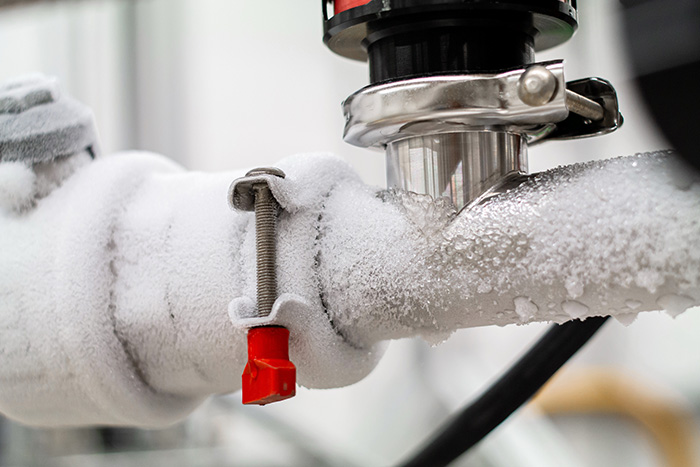
When winter temperatures dip below freezing, your home’s plumbing system can be at serious risk—especially if your pipes aren’t properly insulated or maintained. At Drain City Plumbing, we’ve seen firsthand how frozen pipes can cause significant damage, from burst plumbing to costly water leaks. But the good news? There are steps you can take to minimize damage and get things flowing again quickly and safely.
Here are five expert tips on what to do if your pipes freeze—plus a few preventive measures to help you avoid it happening again.
1. Turn Off the Main Water Supply Immediately
The first and most important step when you suspect frozen pipes is to shut off your home’s main water supply. Why? Because frozen water expands—and when it melts, it can rupture the pipe and lead to severe flooding.
Look for your main water shut-off valve, typically located in your basement, crawl space, garage, or along an exterior wall. Turning it off helps prevent water from gushing out once the ice blockage starts to thaw.
If you’re not sure where your shut-off valve is, now’s a good time to locate it and make sure everyone in your household knows how to use it. In an emergency, acting fast can make a huge difference in preventing major water damage.
2. Identify the Frozen Pipe and Assess for Damage
Frozen pipes aren’t always easy to find, but there are a few signs to watch for:
- No water or only a trickle comes out when you turn on a faucet
- Frost on visible pipe sections
- Strange smells coming from drains or faucets (a sign of a blockage)
Once you’ve pinpointed the frozen section, inspect the pipe for visible cracks or bulges. If you spot any damage, don’t attempt to thaw it yourself—call a licensed plumber right away. Trying to thaw a cracked pipe can cause it to burst and flood your home.
At Drain City Plumbing, we offer emergency plumbing services throughout the Portland metro area. If you’re unsure whether your pipe is safe to thaw, give us a call and we’ll help assess the situation.
3. Use Safe Methods to Thaw the Pipe
If the pipe appears intact and undamaged, you can carefully attempt to thaw it using safe, controlled methods:
- Hair Dryer: Aim a hair dryer at the pipe, starting from the end nearest the faucet. Keep it moving and never leave it unattended.
- Warm Towels: Wrap warm, damp towels around the pipe to slowly raise the temperature.
- Space Heater: Set a space heater in the room (never directly against the pipe) and allow the ambient heat to do the work.
Never use open flames like blowtorches or propane heaters. These methods are dangerous and can cause fires or further damage to the pipe.
Be patient—thawing a pipe can take time. Once water begins flowing again, keep the faucet open for a few minutes to help the system stabilize.
4. Check for Leaks Once Water Is Restored
Even if your pipe appears undamaged during the freeze, it could have developed tiny cracks or weak spots. Once the ice has melted and water pressure returns, monitor the area closely for any signs of leakage:
- Drips or pooling water around pipes
- Damp spots on walls, floors, or ceilings
- Sudden drop in water pressure
If you notice any of these symptoms, don’t wait—call a professional plumber immediately. What looks like a small leak can quickly turn into a bigger problem if left unaddressed.
At Drain City Plumbing, we’re equipped with the tools and expertise to detect hidden leaks, make fast repairs, and protect your home from water damage.
5. Take Preventive Steps to Avoid Future Freezes
Once the immediate danger has passed, it’s time to think about the long term. Frozen pipes can be prevented with a few key steps:
- Insulate Exposed Pipes: Use foam pipe insulation or heat tape on pipes in unheated areas like basements, crawl spaces, and garages.
- Keep a Drip Going: During cold snaps, leave faucets slightly open to keep water moving and reduce the risk of freezing.
- Seal Drafts: Close gaps around windows, doors, and pipe openings to block cold air from reaching your plumbing.
- Maintain Indoor Temperatures: Keep your thermostat set to at least 55°F—even if you’re away from home.
And don’t forget your annual plumbing inspection. Our team at Drain City Plumbing can help you winterize your system, identify vulnerabilities, and give you peace of mind before the next freeze hits.
Call Drain City Plumbing Before a Frozen Pipe Becomes a Flood
Frozen pipes are more than just a seasonal inconvenience—they can turn into a major plumbing emergency in minutes. At Drain City Plumbing, we specialize in fast, reliable service and long-term plumbing solutions for homeowners throughout the Portland area.
Whether you’re facing a frozen pipe right now or want to prevent it from happening in the future, we’re here to help.
Need immediate assistance or want to schedule a preventive inspection?
Call us today at (503) 966-1984 to connect with our expert team.






